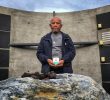Export banana plantations began in Compostela, Compostela Valley Province, in 1992. The plantations are run as growerships, in which primarily small landowners (1.5 � 16 hectares) enter into a contract with the company to provide a certain volume of bananas for a period of 20 years. When they began, Compostela�s plantations were operated by Standard Philippine Fruit Company, or Stanfilco, the banana division of Dole in the Philippines. Packing Plants 90, 92, 95, 98, and 99 are housed in Compostela.
The first unions were built in 1992. The workers of Packing Plants 90, 92, and 95 were members of unions under the yellow federation Alliance of Labor Unions (ALU), which was replaced by the National Federation of Labor in 2000. Packing Plant 99 had an independent, management union, while the workers of Packing Plant 98 were able to establish a genuine union led by Kilusang Mayo Uno (KMU) in 1996.
In 2000, Stanfilco announced that it was shifting to a �Freight on Board� (FOB) production scheme in which it would only buy the bananas produced by the growers, and no longer provide inputs such as fertilizer. The workers were told that a new company was taking over, and that they would be paid for their length of service with Stanfilco. They could return to work under the new management, but as cooperative members who would serve as their own employer on paper, allowing the company to escape from any accountability to them while eliminating their job security. By the end of 2002, the FOB scheme had reached all the farms of Compostela, and the Fresh Banana Agricultural Corporation (FBAC), under the AMS Group of Companies, had taken over production.
The workers of Packing Plants 90, 92, 95, & 99 reluctantly accepted their severance pay, and witnessed the disintegration of their unions. Only the workers of Packing Plant 98, under the leadership of their union led by KMU�Nagkahiusang Mamumuo sa Osmiguel (Namaos-KMU)�were able to successfully foil the plans of Stanfilco and FBAC to bust their union and shift to the cooperative scheme.
The workers of Packing Plant 98 continued to win concrete benefits through their collective action, such as overtime pay, a higher daily wage, vacation and sick leaves, and others. Recognizing the strength and stability of Namaos and the benefits it has brought its members, workers of the other packing plants approached Namaos for assistance, wanting to form genuine unions that will protect their overall interests. In 2004, Nagkahiusang Mamumuo sa SanJose (Namasan) was formed in Packing Plant 95; and in 2005, Nagkahiusang Mamumo sa Suyapa Farms (Namasufa) in Packing Plant 90. Packing Plant 92 Workers Union was organized in early 2006.
As workers across Compostela began organizing under KMU and cases for underpayment of wages and other labor standards violations began to be filed by the unions against the company, harassments from management, local politicians, and the military increased. Two fact-finding missions were conducted in May and August 2006, respectively, which documented the direct intervention of the Armed Forces of the Philippines in union affairs, the complacency of key local politicians, and the violation of workers� basic rights through a complicated production scheme which allows FBAC to wash its hands clean of any obligation to the workers.
In August 2005, the 28th Infantry Battalion conducted meetings in Packing Plants 90, 92, and 95 where unions are being organized. Workers were told to refrain from union activities, told that their union leaders were organizers of the New People�s Army, and that the company would close if they persisted in organizing a KMU-led union.
In barangay San Jose, where Packing Plant 95 is located, military men removed and burned the streamers of Namasan that had their union�s demands written on them. This harassment took place in the midst of the union�s struggle to have FBAC recognized as their employer. On September 26, 2006, after more than one month of their strike, seventy members of Namasan were arbitrarily detained for three days at the Compostela Gym. They have since been released under the custody of a city councilor who sits on the municipality�s labor committee.
Based on documents received from the AMS Group of Companies in September 2006, the Fresh Banana Agricultural Corporation is now under the AJMR Holdings Company in partnership with Sumitomo Fruit (Philippines) Corporation of Japan. The management is employing every available tactic to bust the unions which stand as a direct threat to the profit interests of this gigantic transnational corporation. Small land-owning growers have been pitted against their family members who are workers at the packing plants; packing operations are being shifted to uncertified mini packing units where workers are hired on a contractual basis; and the military has been used to instill fear in the community and hinder workers from asserting their rights. AJMR/Sumifru (Phils.) Corporation has earmarked 10,000 hectares for expansion of their export banana operations in Mindanao. FBAC provides bananas for the Dole and Gracio labels.
Eight (8) cases of grave threat and seventeen (17) cases of harassment/intimidation involving approximately seven hundred four (704) workers of Compostela have been documented by the regional staff of the Center for Trade Union and Human Rights from 2004 to the present.
Chronology of the Labor Dispute at FBAC�s Packing Plant 95
1992 The banana plantation starts in Brgy. San Jose, Compostela under the name Neda Farm–Packing Plant 95, owned by Stanfilco-Dole. It covers approximately 370 hectares.
1993 Alliance of Labor Unions (ALU), a yellow labor federation, enters the plantation and forms a union.
2000 National Federation of Labor (NFL) replaces ALU as the federation. NFL signs a Collective Bargaining Agreement (CBA) with the �individual banana growers� as the employer.
November-December 2001 Banana plantations in Compostela, Compostela Valley run by Standard Philippine Fruit Company (Stanfilco-DOLE) are turned over to Fresh Banana Agricultural Corporation (FBAC) under the AMS Group of Companies owned by the Soriano family, including Packing Plant 95. All workers� length of service is cut and the union is busted. More than 300 regular workers at PP95 were displaced; 70 were rehired, and the contractual workers were made regular. Almost 200 workers work at PP95.
July-October 2002 Workers at Packing Plant 95 are made to attend a seminar, sign a document, and become members of Pag-asa Farmers Association Multi-Purpose Cooperative (PAFAMUPCO), being told by FBAC management that they will be dismissed if they do not sign the document. Every fifteen days P100 are deducted from their paychecks and put toward their �capital share� in the coop. While the workers� paychecks and social security payments are issued in the name of PAFAMUPCO, the source of the money is FBAC.
Workers at PP95 receive below minimum wages at only P137 a day for 14 hours of work. They receive no benefits except social security.
2004 Workers� wages are increased to P162, still below minimum wage.
September 2004 Sumitomo Fruit Corporation invests $16 million in AJMR, the new holdings company of the Soriano Family. FBAC now is under AJMR.
Nov 10, 2004 Workers of Packing Plant 95 organize themselves into Nagkahiusang Mamumuo sa San Jose (United Workers of San Jose), under the leadership of the Kilusang Mayo Uno. Namasan is registered with the Department of Labor and Employment as a legitimate labor organization.
July 2005 Workers� wages are raised to P176, still below the minimum wage required by law. Namasan files a money claims case with the National Labor Relations Commission for underpayment of wages, non-payment of Cost of Living Allowance, and non-payment of service incentive leave.
Jul. 7, 2005 Namasan files for Petition for Certification Election (PCE) in order to have the union recognized as the bargaining agent of the workers. In the process, the issue of Employer- Employee relationship becomes blurred. FBAC claims that PAFAMUPCO is the employer, and denies any responsibility to the workers saying that it is a mere buyer of bananas and a technical support company. The workers� experience in the workplace declares otherwise: packing plant supervisors are direct employees of FBAC; the workers� uniforms have the name of FBAC on them; all quality and control of production is in the hands of FBAC; the workers wages are set by FBAC, and FBAC decides the number of workers assigned per farm.
July 22, 2005 Members of Namasan withdraw their membership from PAFAMUPCO so as to establish a clear Employer-Employee relationship. FBAC management declares that workers that withdraw their capital share will not be allowed to work.
Aug. 19, 2005 FBAC management holds a meeting with the workers in the plant trying to convince them to withdraw their support for the union and not to withdrawal their capital share from PAFAMUPCO. Soldiers of the 28th Infantry Battalion, Philippine Army burn the union�s signs hung near the packing plant calling for the enforcement of minimum wages and the conduct of a Certification Election while the meeting is ongoing.
Aug. 21, 2005 Members of the Philippine Army – 28th Infantry Battalion hold a meeting in Packing Plant 95, with nearly 200 workers present. The workers are told to stop engaging in union activities, to surrender their leaders, and to maintain their membership in the cooperative.
Aug. 25, 2005 PAFAMUPCO disburses the capital shares to the workers who withdrew their membership.
Aug. 28, 2005 Those workers who had withdrawn their cooperative membership are not allowed in the plant. They are issued no communication about this; the guard at the plant gate simply holds a list which indicated whom to let in the plant and whom to keep out.
Sept. 23, 2005 Namasan launches a strike on the grounds of illegal lock out.
Sept. 24, 2005 FBAC management meets with representatives of Namasan and agrees to let them back to work.
Sept. 25, 2005 Workers of PP95 return to work after a two day strike. The Certification Election has yet to be conducted, and the issue of the Employer-Employee relationship remains unresolved.
Oct. 12, 2005 The Department of Labor and Employment dismisses Namasan�s Petition for Certification Election.
Feb. 2006 Sumitomo Fruit (Philippines) Corporation takes over AJMR Holdings Company and FBAC. AJMR is the holding company of the Soriano Family who owns AMS Group of Companies.
July 10, 2006 The workers are issued a notice by PAFAMUPCO that they will be terminated due to a lack of funds.
July 12, 2006 An order is issued on the union�s money claims case, requiring PAFAMUPCO and FBAC to pay P3.7 million to the workers.
Aug 12, 2006 196 workers at Packing Plant 95 are terminated.
Aug. 14, 2006 The union files a Notice of Strike on the grounds of mass termination, runaway shop, illegal lock out, and union busting.
Aug. 15, 2006 One hundred votes are cast in the strike vote. All votes are in favor of the strike.
Aug. 18, 2006 The strike is launched.
Aug. 20, 2006 FBAC management meets with the union and local government officials and offers to rehire the workers if they apply under the Eaststar Agricultural Development Corporation– a contractual agency, mandating that their length of service be cut.
Aug. 24, 2006 A Temporary Restraining Order is issued on the workers to refrain from obstructing the transport of bananas to other plants for packing based on a case filed by FBAC for damages.
Aug. 30, 2006 During a negotiation brokered by the National Conciliation and Mediation Board, FBAC management offers the same conditions of employment under Eaststar, but this time for only 26 workers.
Sept. 12, 2006 An order is issued by the Regional Trial Court throwing out the case for damages filed by FBAC. The court dismissed the case on the grounds that the blocking of banana trucks and the gate of Packing Plant 52 where bananas intended for Packing Plant 95 are now being packed is in the context of a labor dispute, and therefore not in the jurisdiction of the RTC.
Sept. 19, 2006 The union reinstates their picket, blocking contractual workers at Packing Plant 52 from packing bananas which should be packed at Packing Plant 95.
Sept. 25, 2006 A second Temporary Restraining Order (TRO) is issued by the Provincial Trial Court after some growers file a case for damages against Namasan at the coercion of FBAC.
Sept. 26-28, 2006 More than 80 eighty workers are arbitrarily detained on charges of contempt of court for defying the TRO. Namasan�s strike continues. Their back wages and benefits have yet to be paid by FBAC.










